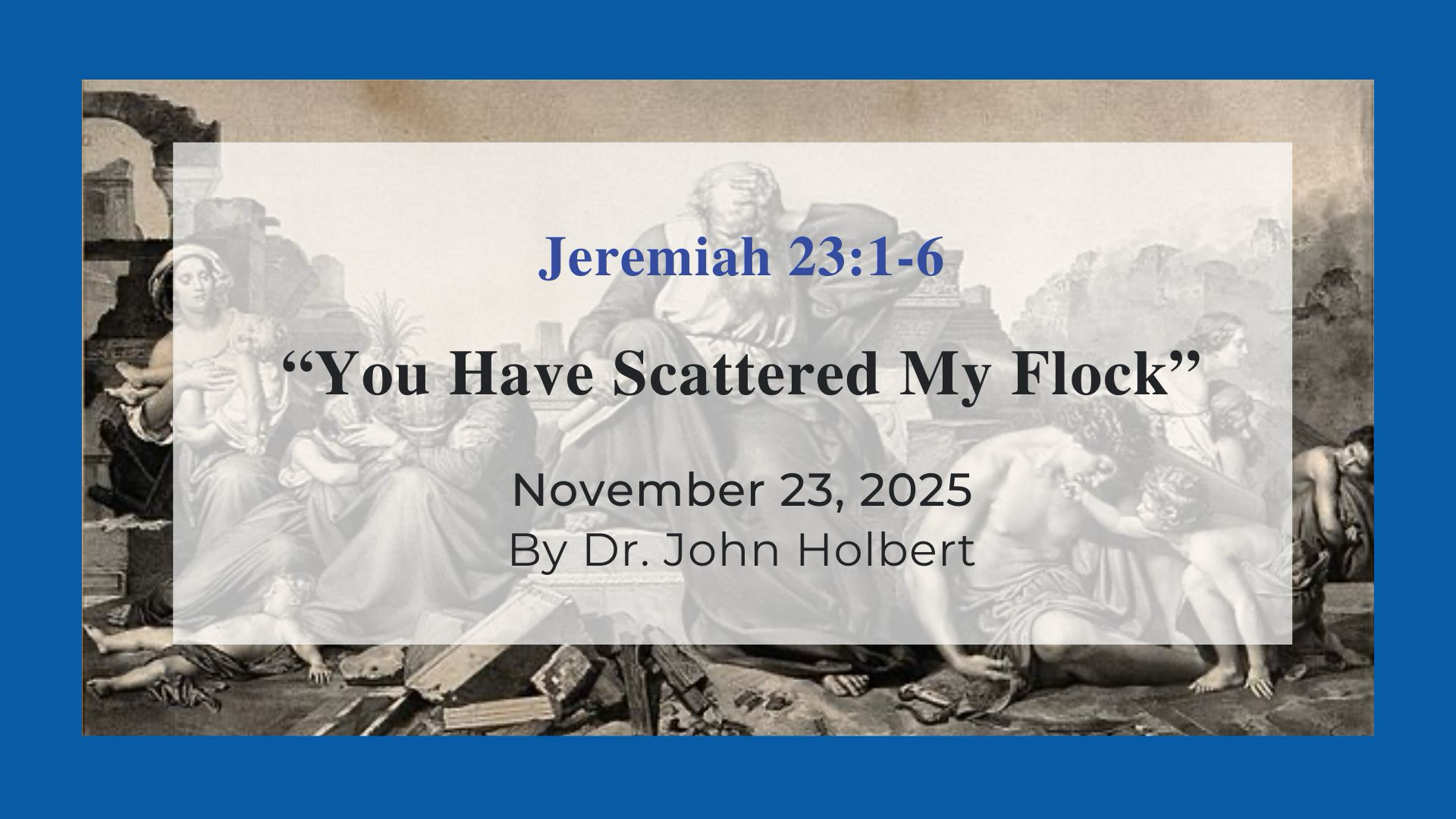You Have Scattered My Flock - Reflections on Jeremiah 23:1-6, Pentecost 24 (Reign of Christ), Year C
by John C. Holbert on Friday, July 4, 2025

On this last Sunday before Advent, once called Christ the King, but now named Reign of Christ, we attend to a text that has long served the Christian church as a kind of prefiguring of the coming of Christ into the world. The Hebrew Bible text is, of course, not about Jesus the Christ, but rather about the reconstitution of the scattered land of Judah and Israel after the terrible exile to Babylon late in the 6th century BCE. That exile was presumably witnessed by Jeremiah, just before he was dragged to Egypt by some of his followers. This text was clearly not composed by the prophet, but was added some years after the exile by a disciple of the prophet to the material now comprising what we know as Jeremiah’s book.
The pericope begins with an accusation against those who allowed the exile to occur in the first place, who made way for the scattering of the chosen people of YHWH. “Woe to the shepherds who annihilate and scatter the flocks of my pasture, says YHWH” (Jer . 23:1). The focus is not on the Babylonian captors, but on the “shepherds,” the leaders of the Israelite people whose shepherding actions were lax, if not downright evil. “Therefore, thus speaks YHWH, God of Israel, concerning the shepherds, (supposedly!) shepherding my people: you it is who have scattered my flock, have driven them away, and have not tended them. So, I will tend you for your evil actions, says YHWH” (Jer.23:2). With nasty double use of the verb “tend” (or “attend” NRSV), the author warns that the so-called shepherds of Israel have failed in their duties for the flock, due to their lack of tending. As a result, YHWH will tend to them in ways they will find terrible.
“I will gather together the remnant of my flock from all the lands where I have driven them, and will return them to their fold where they will be fruitful and multiply” (Jer.23:3). Note that YHWH takes full credit for the exile, while at the same time blaming the false shepherds for their unworthiness. This is not unusual in the Hebrew Bible, where YHWH is chief actor while allowing others free will, a freedom they often misuse. YHWH, because of the actions of scattering the flock will now reverse the process and will bring them back to the promised land once again. Once there, they will “be fruitful and multiply,” echoing the memorable command of YHWH in the creation of all (Gen.1:28). But YHWH’s actions are not complete, until YHWH “raises up for them (or “among them”) shepherds who will (really!) shepherd them; they will no longer be afraid, or terrified, nor any be missing, says YHWH” (Jer.23:4). YHWH vows to replace the wretched shepherds with others who know how to shepherd the flock of God.
Then the writer turns to a more overtly metaphoric description of just who these shepherds (or who this one shepherd) may be. “Look! The days are without doubt coming when I will raise up for David a righteous limb who will surely rule wisely, and will execute justice and righteousness in the land. In his (its) days Judah will be rescued, and Israel will live safely. And this is the name by which it will be known: YHWH is our righteousness” (Jer.23:5-6). The more traditional translation of vs.5 is “righteous branch,” a term also found in Psalm 132:17, Zech.3:8, and again in Jer.33:15. The basic point appears to be that the authors look to a future when a “branch (limb)” from the tree of David, Israel’s greatest king, will shoot up, and that direct descendant from the mighty David will rule in the land, bringing justice and righteousness once again, two crucial characteristics that have been too long missing from the rulers of God’s people (the coronation Psalm 72:1 makes the same claims for the true ruler of Israel). This will be be such obvious traits of the land under this ruler (or rulers) that the land itself will henceforth be known as “YHWH is our righteousness.”
It is little wonder that early Christians, who tried to discern what the coming of Jesus meant to the world, seized on this metaphor of a “righteous limb,” a new coming of David to an age that was desperate for something new and fresh among its leaders. No more Roman emperors, ruling through the terror of legions and the constant need for more money. The world needed righteousness and justice for all.
And nothing, it appears, has changed. The current leader of the US, Donald Trump, appears hell-bent on scattering thousands from our land, some here for decades, while lining his own pockets and those of his billionaire friends with money taken from the mouths of the poorest among us. We, too, need new shepherds who are interested in all the flock, not merely the sleekest and fattest among us. As we approach Advent once again, anticipating the birth of the child at Bethlehem, may we seek him for his righteousness and justice, and may we join him in the search for such activity in our world today.
